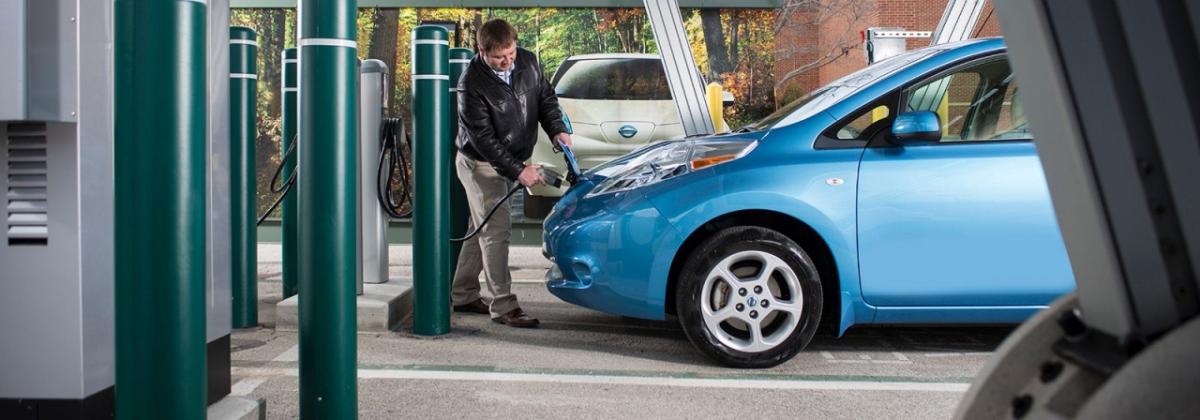Busting 5 Myths About Electric Vehicles
Are EVs costly? Do the batteries need to be replaced frequently? Busting those misconceptions and more.

Originally posted on Duke Energy | Illumination
With gas prices rising, is there an electric vehicle (EV) in your future? A survey released in May by the American Automobile Association found that 20 percent of Americans said an EV would be the next car they buy. That’s up 5 percent from 2017.
Gas prices nationwide are about 70 cents higher than their 2017 lows and $1.20 higher than their three-year lows, a 71 percent increase. When gas prices rise, so does interest in EVs. But to many people, EVs are a mystery. Many respondents in the AAA survey were concerned about finding charging stations and running out of a charge. Here are five myths about EVs and the facts that bust them.
Myth No. 1: Electric vehicles are expensive
Reality: Numerous EV models are competitively priced at $37,000 and less, including the Chevrolet Bolt, Chevrolet Volt, Ford Fusion Energi and Tesla Model 3. Models at $30,000 or less include the Nissan LEAF and Toyota Prius Prime. Used EVs, including the LEAF and Volt, are available for under $15,000.
EVs are cheaper to operate and maintain than combustion engine vehicles. For example, a 60 kilowatt-hour (kWh) EV with more than 230 miles of range is less than $8 to charge at residential rates throughout Duke Energy’s territory. That results in annual fuel savings between $500 and $2,000, depending on mileage. Maintenance costs for EVs, especially battery electric vehicles (BEVs) are lower because they have far fewer moving parts, regenerative braking that reduces wear on brakes and don’t need oil changes.
There’s also a $7,500 federal tax credit for buying new EVs.
Myth No. 2: EVs are not practical
Reality: Battery electric vehicles can go 124 to 335 miles without recharging depending on the vehicle. The average American drives around 30 miles per day. Manufacturers also make plug-in hybrid EVs such as the Chevrolet Volt, which goes 53 miles on battery power and has a combustion engine that provides range like a normal gas car.
A growing fast-charging network makes road trips practical in BEVs. Most fast chargers produce 50 kilowatts (kW), which charges 100 miles of range in less than 30 minutes. Tesla has a nationwide network of 120-kW Superchargers that can charge 100 miles of range in 15 minutes. Superchargers are usually within 50 to 100 miles of each other near major highways and interstates, making countrywide travel in a Tesla practical. Duke Energy has a network of charging stations in North Carolina and introduced its Park & Plug network in Florida.
An average day’s driving of around 35 miles can be recharged at home in a couple of hours using a 240-volt plug (the same plug a clothes dryer uses) and charger. Charging a 110-volt standard U.S. outlet would take longer, about 4 miles per hour.
Myth No. 3: EVs are slow
Reality: EVs provide instant acceleration with 100 percent of torque available immediately and no gear changes, resulting in superior acceleration from a stop. Tesla’s vehicles go from 0 to 60 mph in under 6 seconds with the Tesla Model S P100D clocking 2.5 seconds, making it one of the fastest production cars in the world. The Chevrolet Bolt goes from 0 to 60 mph in 6.5 seconds. EVs handle extremely well with batteries stored evenly below the floorboard providing a low center of gravity and ideal balance.
Myth No. 4: EVs pollute more because of emissions from electricity generation
Reality: Traditional combustion engine cars average less than 25 miles per gallon (mpg) while EVs get an average of 75 mpg equivalent including emissions from electricity production in North Carolina and South Carolina. EVs are more than twice as clean as combustion engine vehicles in the rest of Duke Energy’s service territories. That will continue to improve as the power sector continues to reduce emissions. Also, EVs are the only kind of car that get cleaner the longer you drive them.
Myth No. 5: EVs require expensive battery replacements
Reality: U.S. automakers are required to warranty EV batteries for a minimum of eight years or 100,000 miles, whichever comes first. Many EV battery packs have lasted more than 200,000 miles with less than 10 percent degradation in power capacity.
Electric vehicle rankings
These vehicles earned AAA’s Top Green Vehicle award for 2018: overall, Tesla Model X 75D; subcompact, Chevrolet Bolt EV Premier; compact, Nissan Leaf SL; midsize, BMW 530e iPerformance; large, Tesla Model S 75; SUV/minivan, Tesla Model X 75D; best under $30,000, Kia Niro LX.
Click here to explore the Electric Power Research Institute's guide to electric vehicles.

